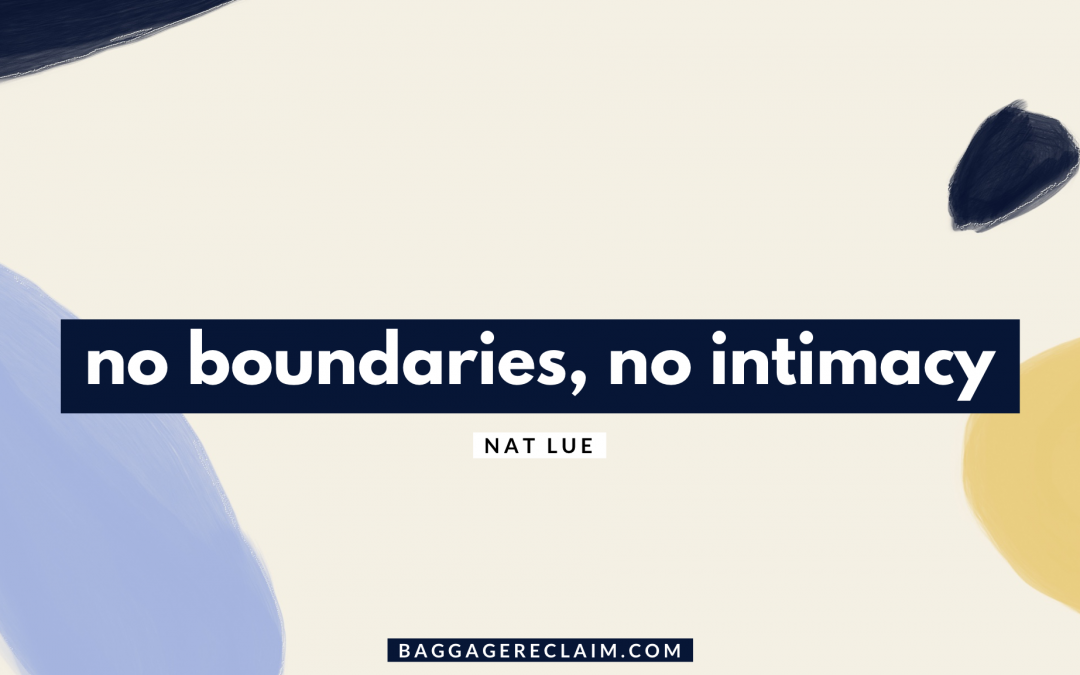I talk to a hell of a lot of people who are, how shall we say it, boundary averse. It’s not because they’re shady. They most certainly don’t want to have issues with people. No, it’s because they see boundaries as threatening. They think that communicating, whether verbally or through actions, what is and isn’t permissible leads to alienation and abandonment. For them, ‘no’ is wrong and leads to hurting people’s feelings and not being liked. At the same time, though, most of these boundary-resistant folks also want to enjoy loving, intimate relationships. They’re also often sick of feeling anxious, resentful, guilty and “not good enough”.
Here’s the thing: No boundaries, no intimacy.
If I can’t let you see, hear and truly know me even though we’re in a relationship, romantic or otherwise, we’re just not that intimate.
If we can’t be honest about our needs, desires, expectations, feelings and opinions, we can’t co-create intimate relationships. Intimacy isn’t there if we can’t say what we like and dislike. Same for when we don’t speak up when we feel uncomfortable or hurt. Not living by our preferences, principles and priorities (our values) leads to us living a lie.
We might act as if we’re always in agreement even when we’re not. It’s fear that giving someone “too much” of an opinion on us will make them run off or hurt us. This is where we blend and merge with them in an ‘I like what you like’ mentality. We figure, Why would they have a problem with someone who’s positioning themselves as being “the same”?
When we avoid broaching difficult conversations, we slip into dishonesty there, too. There’s often fear of hurting feelings (ours and/or theirs) or causing problems. Unfortunately, not speaking up when we need to creates far more problems than it ever solves. We inadvertently shut the other person out of our inner world and the relationship. Of course, if we wear a mask to keep people at a distance and mind our ps and qs for fear of misstepping, that’s not an intimate relationship.
People pleasing is a block to intimacy.
People pleasing to protect ourselves from getting hurt and to keep the person “on side” is a form of dishonesty. We cross boundaries by taking responsibility for other people’s feelings and behaviour while avoiding feeling and knowing too much about our needs, expectations, desires, feelings and opinions. It’s a covert way of meeting our needs. So we people-please to gain attention, affection, approval, love and validation. On some level, we expect people to be and do as we need, want and expect because of our pleasing. Like a reward.
With people pleasing, we hope to avoid and minimise conflict, criticism, stress, disappointment, loss and rejection. These are all part of partaking in the intimacy of life, though. So, yes, we might be scared of conflict, but being willing to risk the possibility of it through our authenticity is part of intimacy.
Sometimes our struggle with boundaries manifests as us settling for crumbs in an unhealthy relationship. At best, we ignore code amber issues and at worst, we stay despite code red issues.
When we accept the unacceptable and call it “love”, intimacy cannot be a part of that relationship. It can’t. Pain and delusion aren’t love.
Our response to someone crossing our boundaries needs to reflect an emotional, mental, physical and spiritual adjustment. How we show up has to acknowledge the difference between us and them. It needs to acknowledge that something happened. Blaming ourselves for their behaviour and making us responsible for fixing/healing/helping them isn’t that. And denying, rationalising, minimising and excusing just blurs the lines even further.
Knowing and expressing our line and our limit is crucial. We need boundaries, not just for our emotional, mental, physical and spiritual well-being but for the health and wealth of our relationships.
We can love others and love ourselves at the same time. Yes, really.
And if we can’t, there’s a boundary issue. Healthy boundaries mean knowing the difference between our thoughts, feelings, body, stuff, and someone else’s. If we don’t know where we end and others begin, we can’t have intimacy.
We might think we’re experiencing intimacy because we’re claiming we’re the same as the other party. We decide that how we see, feel and do things is how they do. But… that’s the boundary problem of codependency. It’s why we might avoid being who we really are even though it’s different to someone else’s version of being themselves.
The more willing we are to have and create healthy boundaries, the more intimacy we experience because we’re honest about who we are, what we like, what matters to us, and what we need, want, expect, feel and think. We must have boundaries if we want to give and receive love, care, trust and respect and enjoy intimate relationships. Knowing where we end and others begin is the gateway to intimacy.

 Add to favorites
Add to favorites 
